|
TRANSLATE THIS ARTICLE
Integral World: Exploring Theories of Everything
An independent forum for a critical discussion of the integral philosophy of Ken Wilber
 David Christopher Lane, Ph.D.
Professor of Philosophy, Mt. San Antonio College Lecturer in Religious Studies, California State University, Long Beach Author of Exposing Cults: When the Skeptical Mind Confronts the Mystical (New York and London: Garland Publishers, 1994) and The Radhasoami Tradition: A Critical History of Guru Succession (New York and London: Garland Publishers, 1992). David Christopher Lane, Ph.D.
Professor of Philosophy, Mt. San Antonio College Lecturer in Religious Studies, California State University, Long Beach Author of Exposing Cults: When the Skeptical Mind Confronts the Mystical (New York and London: Garland Publishers, 1994) and The Radhasoami Tradition: A Critical History of Guru Succession (New York and London: Garland Publishers, 1992).
THE STUDY OF CONSCIOUSNESS
Glimpses into the Life and Work of Great Thinkers in Neuroscience and Philosophy
Chalmers |
Changeux |
Chomsky |
Churchland, Paul |
Churchland, Patricia |
Crick |
Dennett |
Edelman |
Flanagan |
Humphrey |
Huxley |
Koch |
Leary |
Lilly |
McKenna |
Nagel |
Tononi
Francis CrickEthan LiFrancis Crick was born on June 8, 1916, in Northampton, England. He attended the Northampton Grammar School and Mill Hill School in London, then the University College London where he began his studies in physics. Crick graduated with a Bachelor of Science degree in 1937, then later conducted his Ph.D. research in 1939 only to be stopped by the breakout of World War II. 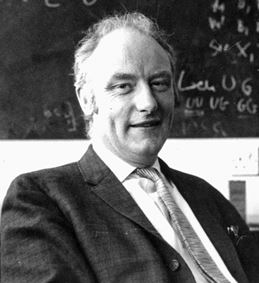 Francis Crick Crick was highly involved during the war, developing magnetic and acoustic mines, but soon after began to study biology which at first he knew very little of. He resumed his studies at Cambridge University working at the Strangeways Research Laboratory, then later Cavendish Laboratory in 1949. In 1951, he met a young biologist, James Watson, who they would together discover the double helix structure of DNA. Francis Crick finally received his Ph.D. from Cambridge's Gonville and Caius College in 1954. Crick and Watson were both co- awarded (along with Maurice Wilkins) the Nobel Prize in Physiology or Medicine in 1962. As groundbreaking as his contribution to biological science are, Crick had developed his own theories on human consciousness that provided an enlightening perspective on the structure and neurobiology of the brain. In 1994, Crick published The Astonishing Hypothesis in which he described his ideas about consciousness. In this work, it covers the rudimentary necessities required to study consciousness itself while providing an overarching analysis of how awareness arises within a societal context. Instead of delving into the generalities of human consciousness and its various manifestations, Crick focused on visual systems and dissected the prerequisites required for awareness to exist and experience differing events (thoughts, perceptions, etc.) within the brain. While discussing visual systems, he suggests that future experimentation is required to provide holistically gathered and empirical data for furthering the understanding of the human consciousness, such as the testing of free will. Following a reductionist paradigm, Francis Crick believed that the key to understanding human consciousness was through the research and understating of neural functions both individually and in tandem when neural systems are working together: synapses, dendrites, axons, etc. The first step is through the understanding of how the brain interprets visual stimulation and how the brain gathers information about the events around it. This begs the question of where consciousness is located, so Crick states that one must also determine what is responsible for determining the location of consciousness itself. He agrees with the notion that consciousness may be clustered throughout regions of the brain; whether that be a single unifying region or multiple versus the notion that consciousness in ingrained in every cell of the body. After a discovery of the location of the cells that dictate consciousness, theoretically speaking, one can then determine what events, objects, or thoughts are relegated to the subconscious—a task seemingly impossible without the proper understanding of one condition or the other. Crick writes that singular cells cannot dictate responsibility of recognizing objects or events for there are more objects in the world than cells in the human brain. Therefore, because of the aforementioned theory that cells must be working together to create consciousness, cells must be working in tandem to recognize and cognitively identify objects or events. This is because there is almost an infinite (and therefore sufficient) amount of combinations by which cells can create in the brain to perceive different objects or events that an individual can encounter. The problem that arises is known as “the binding problem” which is identifying what specific cells are working together to recognize objects and when they are co functioning. Francis Crick was a strident atheist, believing that scientific research and understanding removed the necessity for religious doctrine that provided explanations of natural phenomena which at first seemed unexplainable to humans. Just like his discovery of DNA, this work takes time and at first seems too daunting of a task to tackle. Through the bettering of technology and scientific innovations, Crick believeed that humans will eventually uncover what drives human consciousness. The first step is in precisely discovering the locality of human consciousness. Further Reading1. The Astonishing Hypothesis, Scribner; Reprint edition (July 1, 1995) 2. Of Molecules and Men, Prometheus; First Edition edition (April 1, 2004) 3. Life Itself: Its Origin and Nature, Simon and Schuster (January 1, 1981) 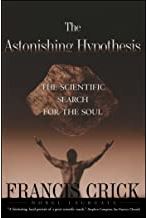 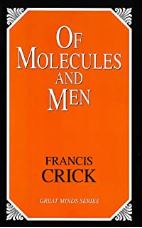 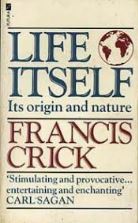 A REVIEW OF The Astonishing HypothesisDavid Christopher LaneThis book review was first published in the University of California magazine commemorating Francis Crick (circa 1995) Francis Crick is a charming and disarming man, with a good sense of humor and a quick, ironic wit. It is these very same traits which makes reading The Astonishing Hypothesis such a joy to read. Although there has been something of a publishing bonanza in books dealing with the brain/mind/computer connection, they have with a few exceptions been weighted down by cumbersome reasoning (especially works trying to connect quantum theory with mysticism). Such is not the case with Crick's latest tome, since he argues with clarity, focus, and ease. His hypothesis, astonishing or not, is really quite simple: man has no soul, no spiritual self which transcends his/her physical frame. What we take to be the soul, Crick argues, is nothing more than a complex network of neurons. We are to the very core physical beings who have somehow deceived ourselves into believing that we are something more, something non-material, something transcendent. That is the prejudice, of course, which Crick is trying to overcome by gallantly stating that science should explore the question of consciousness with as much dedication as we have the sky, the atom, and the evolution of life. And what Crick thinks we will eventually discover is a physical basis for consciousness, something which resides in the parallel processing of a vast neural internet. As Crick so astutely puts it: The Astonishing Hypothesis is that “You, your joys and your sorrows, your memories and your ambitions, your sense of personal identity and free will, are in fact no more than the behavior of a vast assembly of nerve cells and their associated molecules. As Lewis Carroll's Alice might have phrased it: "you're nothing but a pack of neurons.” This hypothesis is so alien to the ideas of most people alive today that it can be truly called astonishing. Now on the surface of it, Crick's argument seems so obvious as not to be very astonishing at all, especially when we realize that every great discovery in science has been grounded, so to say, in some simpler material structure. Cells turned out be cast from molecules; molecules from atoms; atoms from electrons, protons, and neutrons. Even questions as profound as what is life? (also the title of a highly influential book by the famed physicist Erwin Schrodinger) which plagued biologists during the early and mid-part of this century turned out to have a physical, if minute, answer: the D.N.A. molecule. Yet, many thought the answer would never be found because life was something vitalistic, something non-material, something science could not identify. As it turns out, though, every endeavor to locate the secrets of the universe hinge on focusing first and foremost on the empirical realm. As Crick sees it, why shouldn't consciousness have a physical basis? Hearing does. Seeing does. Why not being as well? To Crick's credit, and unlike that of Daniel Dennett's over-hyped and under-documented Consciousness Explained, he does not claim to have the final answer to the mystery of awareness; rather, he wants to posit a well-thought out blueprint on how neurons could produce something as unlikely as self-reflective consciousness. Crick does this by centering on how we see things, since vision is such an elemental part of most individuals day to day world. As Crick explains: The mental picture that most of us have is that there is a little man (or woman) somewhere inside our brain who is following (or, at least trying hard to follow) what is going on. I shall call this the Fallacy of the Homunculus ( homunculus is Latin for "little man"). Many people do indeed feel this way--and that fact, in due course, will itself need an explanation--but our Astonishing Hypothesis states that this is not the case. Loosely speaking, it says that "it's all done by neurons." Crick isn't simply being glib when he says that neurons are the basic unit by which we should understand the profound display of awareness. Keep in mind, it was this very sort of radical reductionism which led to the discovery of the double helix molecule. Without such a positivistic, empirical approach, there wouldn't be a genome project, much less the amazing discoveries--almost monthly--of how and where certain diseases are located and copied in our genetic code. To be sure, Crick is a thoroughly materialistic scientist, always grounding his insights in the observable world, but shouldn't we all be to some extent given the wonderful successes of just such a posture? True we may not like the implications of Crick's hypothesis (as Patricia Churchland so exquisitely sums it, "we are simply three pounds of glorious meat, wonder tissue"), but can we escape its factual elegance? Even now, as I type these lines on the computer, if I close my eyes just for a second the whole visual world collapses into darkness. Why? A very thin layer of skin (my eye lids) have sealed off the infusing light so that my eye (no pun intended) can no longer transfigure the incoming data. I have gone blind temporarily not because of karma, not because of some sort of sin, not because of God intervening, but because of a very ordinary physical happening. . . I blinked. If blinking can cause the bright universe to go dark, is it really a stretch of our imagination to believe that consciousness is the outcome of chemical-electrical processes in the brain? I think not. Indeed, it takes a much greater investment in faith to believe that "I" am something more than neurons firing. Crick even has the audacity to claim that he might have discovered where "free will" is located in the brain: My first assumption was that part of one's brain is concerned with making plans for future actions, without necessarily carrying them out. I also assumed that one can be conscious of such plans--that is, that they are subject to at least immediate recall. My second assumption was that one is not conscious of the "computations" done by this part of the brain but only of the "decisions" it makes--that is, its plans. Of course, these computations will depend on the structure of that part of the brain (derived epigenetically and partly from past experience) and on its current inputs from other parts of the brain. My third assumption was that the decision to act on one plan or another is also subject to the same limitations. In other words, one has immediate recall of what is decided but not of the computations that went into the decision, even though one may be aware of a plan to move. Then such a machine (this was the word I used in my letter) will appear to itself to have Free Will provided it can personify its behavior--that is, it has an image of "itself." The actual cause of the decision may be clear cut [Patricia Churchland's addition], or it may be deterministic but chaotic--that is, a very small perturbation may make a big difference to the end result. This would give the appearance of the Will being "free" since it would make the outcome essentially unpredictable. . . Such a machine can attempt to explain to itself why it make a certain choice (by using introspection). Sometimes it may reach the correct conclusion. At other times it will either not know or, more likely, will confabulate, because it has no conscious knowledge of the "reason" for the choice. This implies that there must be a mechanism for confabulation, meaning that given a certain amount of evidence, which may or may not be misleading, part of the brain will jump to the simplest conclusion. As we have seen, this can happen all too easily. . . Free Will [it appears] is located in or near the anterior cingulate sulcus. Crick may turn out to be wrong in the details of his theory (if God resides in the details, as the popular saying goes, so does our understanding of awareness), but I think he is right on the mark to focus our aim in the direction of the neural pathways of the brain. If we do not follow such a materialist paradigm to understand consciousness, we may be then left with the likes of Shirley and crew telling us to find our true selves (along with Elvis presumably) in the higher astral worlds. . . no doubt at the added expense of having to attend some New Age seminar first to get the "correct" directions. On the other hand, the scientific search for the soul, according to Crick, will end up not finding one, but will instead reveal that we are, in sum, nothing more and nothing less than neural surfers riding stimulus waves in the cerebral hemispheres. As a surfer myself of ocean waves, I think Crick will eventually be proven correct. *Note: Not surprisingly, the only major objection I have with Crick's book, The Astonishing Hypothesis, is his section, albeit brief, on animal testing. Writes Crick, "Even if new methods are devised, so that much better neuroanatomy can be done on humans, there are still many key experiments that can only be performed on animals. Most of these experiments produce little if any pain, but when they are over (in some cases they may last for months), it is usually necessary to sacrifice the animal, again quite painlessly. The animal rights movement is surely correct in insisting that animals be treated humanely, and as a result of their efforts animals in laboratories are now looked after somewhat better than they were in the past. But it is sentimental to idealize animals. The life of an animal in the wild, whether carnivore or herbivore, is often brutal and short compared to its life in captivity. Nor is it reasonable to claim that since both animals and humans are 'part of Nature' that they should be entitled to exactly equal treatment. Does a gorilla really deserve a university education? It demeans our unique human capabilities to insist that animals should be treated precisely the same way as human beings. They should be certainly handled humanely, but it shows a distorted sense of values to put them on the same level as humans." Here Crick's reasoning is not only fallacious (granting a gorilla entrance rights to the University of California is one thing; killing him or her is quite another), but ethnocentric to the extreme. If, as Crick argues, we are nothing more than sophisticated neural chemistry, then how many neurons does an animal need in order to have its life not terminated for scientific research? One hundred thousand? One million? Crick's argument is inane, especially when we consider that our DNA code is almost identical (99%) to that of chimpanzees. Sorry about that "cheetah," but your one percent shy on the genetic test. Off to the death camps for you! Our use of the word laboratory, from the living perspective of the animal, is simply a euphemism for incarceration, occasional torture, and death. I would love to see how Crick would plead his case to a species (exo-biological in origin, presumably) which had a more developed brain than himself. He probably couldn't communicate to them, though, since they most likely would not understand his "primitive" cries. Poor human, not enough neurons--off to the "laboratory" for him. MSAC PHILOSOPHY GROUP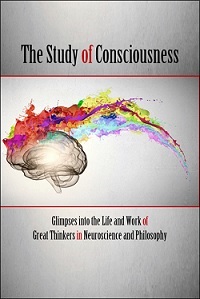
Human interest in the nature of consciousness dates far back to our ancestral past. However, it is only in the last century or so that researchers and philosophers have been able to tackle the problem in a more scientific way. This is primarily due to our increasing understanding of human physiology and how our brain functions. With the advent of ever more sophisticated technology—from fMRI scans, functional magnetic resonance imaging, to DARPA's neural engineering program, understanding neural “dust”—we are now able to not only create vivid simulations of cerebral activity but also to systematically reverse engineer the brain. Whether such empirical observations will unlock the secrets of self-reflective awareness is still open to vigorous debate. Nevertheless, the study of consciousness is now considered to be of elemental importance and has invited a large number of brilliant thinkers—from a wide range of disciplines, including mathematicians, quantum physicists, neuroscientists, and philosophers—to join in the discussions and offer their own contributions. The following essays briefly explore the life and work of pioneers in the field of consciousness studies. Included in this eclectic mix are such notables as Giulio Tononi (University of Wisconsin), Paul and Patricia Churchland (University of California, San Diego), Noam Chomsky (M.I.T.), the late Timothy Leary and Terence McKenna, and Jean Pierre Changeux (Collége de France) among others.
Comment Form is loading comments...
|